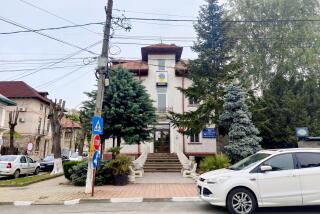Road From Romania Ends In Family’s Arms
- Share via
WESTMINSTER — It had taken a days-long hunger strike by her family, some unusual bureaucratic maneuvering, a grueling, 10-hour train ride though Romania and a 20-hour overseas flight to get Livia Groza to the United States. And when the journey finally ended Tuesday, she headed straight for the kitchen.
Not to eat, but to work. It was her party, but Groza couldn’t resist helping out with an array of Romanian delicacies that her family had prepared at their Westminster home to celebrate her long-sought immigration.
Finally, after everyone else had been served, the guest of honor agreed to sit down. Sampling a piece of soft bread with an amazed look on her face, Groza whispered to her 9-year-old granddaughter, Emanuela, in her native tongue: “In Romania, the bread is as hard as the table.”
It had been a long road to the table.
In late 1984, her son-in-law, 31-year-old Vasile Sofroni, had eluded armed Romanian border patrol guards and sneaked through trenches to escape what he calls the oppressive life style of the East Bloc regime in Romania. A maintenance worker, he eventually settled in Westminster and was able to bring his wife, Lia, and two children to the United States to be with him.
But Groza was left behind.
For three years, her family in the United States desperately cited her failing health and inability to work as grounds for her immigration. Rep. Robert K. Dornan (R-Garden Grove) offered assistance. But the U.S. Immigration and Naturalization Service rejected her visa application this May, saying that Groza, now 55, was still young enough to support herself and thus did not have to be with her family.
That was before the fast. With their traditional immigration routes exhausted, Lia and Vasile Sofroni camped outside the federal immigration office in Westminster in July and went on what ended up being an 80-hour hunger strike.
The media publicized their story around Southern California. Dornan renewed his calls for assistance. And outgoing INS Western Regional Commissioner Harold Ezell appealed directly to federal officials for help in the case.
The INS reversed itself. On their second review, federal officials decided that Groza’s poor health and the Romanian government’s refusal to let her work after she had applied for a visa warranted a rarely used humanitarian visa.
“We had all the right ingredients (for a humanitarian) visa,” said Dornan aide Patricia Fanelli, who worked on the Groza immigration for a year and helped welcome her Tuesday. “It was a very compelling case--a woman under an extremely suppressive government, with her family gone, and she’s sick and unable to work.”
With her visa finally approved, Groza said a tearful goodby to friends in Romania, took a 10-hour train ride from her village of Giulvaz to the Romanian capital in Bucharest and flew to New York City, where she was met by Vasile Sofroni. They flew together to Los Angeles.
By the time she arrived at Los Angeles International Airport early Tuesday afternoon, more than a dozen media representatives had gathered to mark her arrival. Seemingly overwhelmed by the glare of the cameras, she said through her son-in-law: “I never thought in my life I’d see such a thing.”
Groza seemed a bit embarrassed by all the attention, as other passengers crowded around to see what all the commotion was about. A few strangers even came up to Groza and kissed her.
With little knowledge of English, she deferred to Vasile Sofroni on reporters’ questions. One television reporter in search of evening news film of Groza actually speaking asked: “Do you think she could say ‘thank you’ for us?”
“Thank you, thank you,” Groza responded.
Her daughter and two grandchildren--Emanuela and Novac, 5--arrived late at the airport and made their way through the crowd to embrace Groza tearfully. “I feel very, very happy, very lucky,” said Lia Sofroni.
The Sofronis are taking a two-week vacation with plans to go to Disneyland, Las Vegas and San Diego.
But Groza said she doesn’t particularly care what she and her family do. “I don’t want to go anywhere. I just want to stay here with my family and be happy,” she said in Romanian as she gave her granddaughter/translator, Emanuela, a gentle nudge.
And she said she has no desire to return to her homeland, wanting instead to leave the memories behind.
Explained her son-in-law, Vasile Sofroni: “Here, we got everything. There, they stand in line three, four hours for piece of bread. There, if you want to go from the village to the city, they ask you why you want to go. . . . Here, we have freedom. Why go back?”
More to Read
Sign up for Essential California
The most important California stories and recommendations in your inbox every morning.
You may occasionally receive promotional content from the Los Angeles Times.













